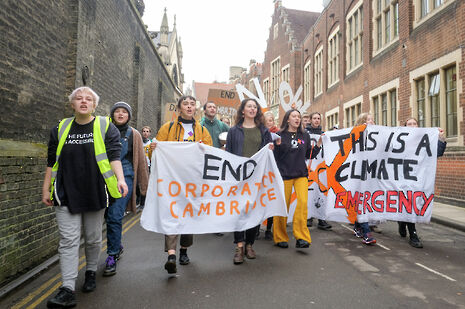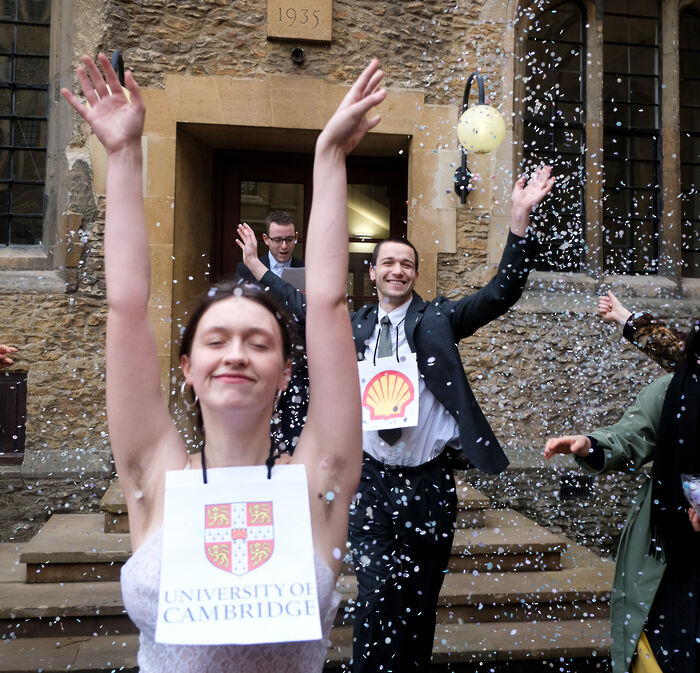Divestment campaign gathers widespread support ahead of crucial University decision
Over 300 academics and 1,100 students have signed an open letter and petition urging the University to fully divest from fossil fuels

More than 300 Cambridge academics have signed an open letter calling for the University to divest completely from fossil fuel industries.
The open letter comes ahead of a crucial meeting of the University Council set to take place next Monday, which will see discussion of the report submitted by the University’s Divestment Working Group which was established in May 2017 to make recommendations about the company’s investments.
The open letter, published today by Cambridge Zero Carbon Society, condemns both the University’s involvement in polluting industries and its “unacceptable subversion of democratic structures” after the University did not commit to divestment, instead setting up a working group, despite the passage of a pro-divestment grace through Regent House last year.
The grace, submitted by 140 members of Regent House, called for “none of the University’s Endowment Funds [to] be invested directly or indirectly in companies whose business is wholly or substantially concerned with the extraction of fossil fuels, and requires the Council to publish a Report to the University within twelve months setting out how this is to be achieved.”, to which the council responded: “the Grace cannot operate as a mandate in respect of the exercise of their fiduciary responsibility for the University’s investment practices”, but “[recognised] the strong feeling amongst those who have signed the Grace” and instead commissioned the working group report.
Notable signatories include former chief scientific advisor to the government, Sir David King, and former president of the UK Science Council and emeritus professor of biochemistry Sir Thomas Blundell.
Dr Robert Macfarlane, author and fellow of Emmanuel College, also signed the open letter and emphasised the importance of change, saying: “If it fails to divest, Cambridge will be on the side of dirty money over a sustainable future.”
Currently, the University holds some direct investments in fossil fuel industries, though it has consistently claimed that these are “negligible”. Meanwhile, its indirect investments – which came under scrutiny following the Paradise Papers’ revelations of the University’s tax avoidance through offshore fossil fuel holdings last November – include a total of £1.3m in Guernsey-based private equity firm Coller International, channelled principally towards oil and gas company Royal Dutch Shell.
Environmental campaign group People and Planet estimate that the University’s investments in fossil fuels total £337 million.
In recent months, several prominent UK universities – including Durham, Bristol, Edinburgh and Cardiff – have pledged to divest, spurring claims that Cambridge is lagging behind other institutions. Pembroke History fellow Dr Lucy Delap remarked that “Cambridge University is an ambitious world leader in so many fields – and it’s not too late to join other leading UK universities in divesting from fossil fuels.”
A petition for students, launched on Monday, has gathered over 1,100 signatures of students calling for divestment. Emphasising the large scale of support among students and staff alike, Dr Drew Milne, English faculty lecturer and signatory of the open letter, said, “The University’s management cannot ignore the clearly stated wish of the University to move towards full divestment of fossil fuel investments without further delay.”
Daniel Zeichner, Labour Party MP for Cambridge, also expressed his firm support for the divestment campaign.
This open letter is the latest in a series of actions coordinated by the Cambridge Zero Carbon Society in an attempt to push the University to change its investment protocols and strategies. Yesterday, a group of fifteen pro-divestment student activists prevented staff from entering the University’s finance office, protesting the “business as usual” attitude of the University in response to what they describe as a climate “crisis”.
Last term 359 staff and students marched through the streets calling for ‘Corporation Cambridge’ to divest, Zero Carbon’s largest organised action to date. On Valentines’ Day members of the Zero Carbon Society performed a mock wedding between Cambridge University and Shell outside a meeting of the University’s Finance and Business Committee, while another high-profile stunt involved a banner drop at the annual Oxford and Cambridge boat race in March.
 News / Colleges charge different rents for the same Castle Street accommodation2 March 2026
News / Colleges charge different rents for the same Castle Street accommodation2 March 2026 News / King’s hosts open iftar for Ramadan3 March 2026
News / King’s hosts open iftar for Ramadan3 March 2026 News / Angela Merkel among Cambridge honorary degree nominees27 February 2026
News / Angela Merkel among Cambridge honorary degree nominees27 February 2026 Theatre / Lunatics and leisure centres 4 March 2026
Theatre / Lunatics and leisure centres 4 March 2026 News / News in Brief: waterworks, wine woes, and workplace wins 1 March 2026
News / News in Brief: waterworks, wine woes, and workplace wins 1 March 2026









